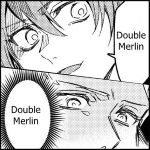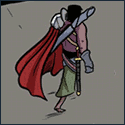|
Harrow posted:I love this system's bones, at least on a reading, but I can see how it's sort of... lopsided. I agree with this statement so hard I don't really know how to express it. E: Woo, page 6!
|
|
|
|

|
| # ? May 1, 2024 22:56 |
|
QuantumNinja posted:I agree with this statement so hard I don't really know how to express it. I'm excited about the fact that it's going to be treated as an open-source system, though. I'm excited to start hacking it apart and rearranging it myself.
|
|
|
|
It'll be cool to have a system that isn't Fate or *AW. The world feels like everything is the first world or the second*. *Except for Shadowrun which is the 6th.
|
|
|
|
Is someone doing a pirate hack yet? It seems like a very natural fit.
|
|
|
|
Sorta? Its very fantastical pirates.quote:UNLOCKED ($115,000) Womb of Night: A black expanse stretches between the stars, whose dim light shelters the thousand colonies of humanity. Riding the star-seas between them are crews of traders, marauders, explorers and pirates - all guided by the Sisterhood, whose Navigatrix acolytes portend safe passage through the hellish storms that make up the roiling mass they call the warp-space. There is also a sea based add-on to the Duskwall setting. quote:UNLOCKED! ($45,000) Leviathan Song: The hunting vessels sail out from Duskwall, enormous steam ships financed by the noble houses, captained by their unrecognized scions, and crewed by the unwashed masses. Following signs from shipboard dogs, gifted orphans, and madmen trained to hear the demon-song chanted in the depths, they sail the Never Sea, harpoons and hoses ready, preparing to drain the great beasts of their precious fluid. A new playset by Jonathan Walton (author of the Dungeon World Planarch Codex). They Might be able to be used as a base for rehacking into traditional pirates though.
|
|
|
|
Are there any actual play things I could watch/listen to to get a good idea of how the game flows and how combat works? (I'm especially interested in combat--do you just have one clock for the opposition and tick things off as you kill enemies? What determines when an enemy dies? Just progress on the clock?)
|
|
|
|
The system has changed enough since the KS that there isn't anything accurate to how the game is right now, but you can still watch the AP provided in the actual KS: https://www.youtube.com/watch?v=jsmw4wC7iOE The game treats "combat" the exact same way it treats all task resolution.
|
|
|
|
Lemon Curdistan posted:The game treats "combat" the exact same way it treats all task resolution. Which is to say, the whole combat is one obstacle clock, and the effect of each PC's action determines the progress on that clock (and enemies should die/be disabled/flee as is narratively appropriate depending on actions and progress on the clock)? Also, how is effect determined? I remember reading earlier in the thread that there at least used to be separate rolls for an action and then for its effect, but I don't see anything like that now.
|
|
|
|
Harper has posted more recent APs on his YouTubes, too.
|
|
|
|
Harrow posted:Which is to say, the whole combat is one obstacle clock, and the effect of each PC's action determines the progress on that clock (and enemies should die/be disabled/flee as is narratively appropriate depending on actions and progress on the clock)? Now Effect is determined after the action roll by comparing the "quality, scale, and potency" of the player character compared to their obstacle. The PC gets 1-3 Effect based on that comparison. Critical action rolls and fine gear both add 1 to that outcome (maybe still to a cap of 3, not sure), while partial successes and failures may subtract from that outcome. I personally prefer the "choose one die to be your action roll outcome and another to be your effect" method that we saw in an earlier playtest document, but maybe that's just me.
|
|
|
|
Jimmeeee posted:Now Effect is determined after the action roll by comparing the "quality, scale, and potency" of the player character compared to their obstacle. The PC gets 1-3 Effect based on that comparison. Critical action rolls and fine gear both add 1 to that outcome (maybe still to a cap of 3, not sure), while partial successes and failures may subtract from that outcome. Actually, effect is now mostly GM discretion, and determined before the roll (just like the riskiness of the situation). It does suggest using those things as a guideline however. Here's the play example on page 5: Blades QuickStart v5, page 5 posted:Player: "I rush across the courtyard and vault over the hedge, hiding in the shadows there." Even the section on it doesn't suggest using precise math. Instead, it basically tells the GM to just do whatever they think is fair: Blades QuickStart v5, page 10 posted:The GM judges the effect level using the profiles at right. Which one best matches the action at hand—Limited, Standard, or Great? Each effect level indicates the questions that should be answered for that effect, as well as how many segments to tick if you're using a progress clock for this obstacle. QuantumNinja fucked around with this message at 00:00 on Jan 15, 2016 |
|
|
|
A question for people who've played: When would a non-Whisper roll the Attune action? What can someone without specific training in ghostly magics do with the Attune action? Related questions: Does the Lurk need to Attune in order to use the Ghost Veil ability, or is that just a "pay the stress and it happens" thing? Does the Whisper need to Attune to use Tempest, or is it the same deal?
|
|
|
|
Harrow posted:A question for people who've played: I assume anyone can roll Attune as all the PCs can be assumed to have basic training in the occult (as represented by actually having the Attune skill) as can a significant minority of crooks, Bluecoats and other people who have to deal with this kind of poo poo. I imagine Tempest requires Attune rolls, yes, even if only to determine how effective it is. I think Ghost Veil is just a pay stress thing. The thing I'm not clear with about Ghost Veil is when it says you go insubstantial, but then there's an additional stress cost to be able to go through solid objects. What does that mean? Do you turn into gas and can go through gaps unless you pay the stress cost or something?
|
|
|
|
Doodmons posted:I assume anyone can roll Attune as all the PCs can be assumed to have basic training in the occult (as represented by actually having the Attune skill) as can a significant minority of crooks, Bluecoats and other people who have to deal with this kind of poo poo. I imagine Tempest requires Attune rolls, yes, even if only to determine how effective it is. I think Ghost Veil is just a pay stress thing. The thing I'm not clear with about Ghost Veil is when it says you go insubstantial, but then there's an additional stress cost to be able to go through solid objects. What does that mean? Do you turn into gas and can go through gaps unless you pay the stress cost or something? I think it's like--you're insubstantial, gaseous and such, but you can't straight-up walk through walls without paying the additional stress.
|
|
|
|
Gonna run a test of this on Saturday. How do people generally handle progress clocks during play? Do you draw them in some place where the players can see them all, or do you keep them hidden but give the players feedback about their overall progress?
|
|
|
|
Harrow posted:Gonna run a test of this on Saturday. I think drawing the clocks on index cards and making them visible to the players is the usual course. I played online, so did it on the VTT, but I made the clocks public information.
|
|
|
|
I ran this game Sunday. I'll write up a summary of what happened; it was fun, but we didn't interact with the rolling mechanisms a whole lot. I'll probably do it for a few more weeks, and post more about how it goes, too.Harrow posted:How do people generally handle progress clocks during play? Do you draw them in some place where the players can see them all, or do you keep them hidden but give the players feedback about their overall progress? Unless you have a great reason (and I didn't in the 6+ sessions of playing this game), make them public. Here's the 'GM Action' about making a clock: Blades QuickStart v5, p. 25 posted:Make a progress clock or tick one down. Keep a stack of index cards handy. Make clocks like crazy! Keep them out where everyone can see. (Emphasis mine.)
|
|
|
|
QuantumNinja posted:Unless you have a great reason (and I didn't in the 6+ sessions of playing this game), make them public. Here's the 'GM Action' about making a clock: Aha, I missed that in the text. Okay, cool. I was already planning on having a battlemat and some markers out for sketching diagrams and stuff so I'll draw clocks on there, too.
|
|
|
|
I've got a couple more rule questions, now that I've run this a couple of times. It's pretty likely that I've missed things in the book or that some of this is supposed to be up to player/GM interpretation, but! 1. What, exactly, can you do with the Attune action? My current interpretation is that if it's covered by a specific special ability that a class has, others can't do it without taking that ability--like attuning to control a ghost would fall under the Whisper's Compel--but I'm not really sure what you can do by "channeling electroplasmic energy" outside of things like Tempest. 2. Are ghosts visible without attuning? Is it up to the ghost? The players are dealing with a ghost right now and I figured he could show himself to them (he wants them to arrange for him to possess a gang leader), but looking through the book it seems that perceiving ghosts at all falls under the Attune action, so I might've sidestepped something. 3. What happens if a ghost possesses a body and the body is killed? Is the ghost ejected, or are they trapped (and potentially could be dissolved in electroplasm and destroyed)? Is it different when the possession goes full vampire?
|
|
|
|
This game's health system is a mess:
Congratulations, you just took harm in Blades in the Dark! How do you get rid of it?
Harrow posted:I've got a couple more rule questions, now that I've run this a couple of times. It's pretty likely that I've missed things in the book or that some of this is supposed to be up to player/GM interpretation, but! 1. Attune should be broadly interpreted. Have fun with it! 2. That's up to your table! My current group is selling powder to drugs that makes them solidify for ~6 hours, and I've ruled that ghosts get to decide their visibility. 3. See the previous question: that's up to you, since the book currently doesn't specify. QuantumNinja fucked around with this message at 06:59 on Feb 2, 2016 |
|
|
|
QuantumNinja posted:This game's health system is a mess: You forgot a step! If you have armor, you can mark that off instead of taking the harm. So we have even more steps in the decision-making process.  Resisting harm is interesting to me, because it means that if you say you want to resist harm, you can do so no matter how well you roll. Even if you roll straight 1s on your resistance roll, you still get to reduce the severity of the harm, you're just going to eat 5 stress for the privilege. In play, it hasn't been super complicated for my group, though it did take a while to explain the concept of the resistance roll to one of my players. Poor dude kept loving up and almost got trampled by Akorosi goats. The healing clock hasn't come up yet, though. I'll probably find some way to simplify it when it does, because the sheer number of downtime actions involved in getting one character back up from even a 2-rated harm is pretty huge. Then again, I get the feeling that players are supposed to play multiple characters (this is even mentioned in the rules for getting "lost" while overindulging in a vice). Maybe the rules expect that, if a character is taking a couple of operations' worth of downtime to recover from a 2-rated harm (which is -1d on all rolls, pretty nasty), then the player should just play a guest star character during that time. Harrow fucked around with this message at 16:04 on Feb 2, 2016 |
|
|
|
I'd been intending to tweak it slightly so that level 2 harm "just" caused a relatively minor effect. Maybe something like you always have to take a disadvantage if you do not have potency in a particular area.
|
|
|
|
Yeah seeing that spelled out I'll probably change harm to something else.
|
|
|
|
New Blades v6 out. John was sick for most of February so a lot of his milestones got pushed back to March. I haven't had a chance to look it over, but changelog: CHANGELOG V6 1. Example of NPC taking action against a PC. See page 23. 2. Players' Best Practices. See page 25. 3. Write-ups for the factions of the Criminal Underworld. See pages 46-49. All of the factions will have write-ups like this in the full book. 4. A guide to supernatural forces. Guidelines for arcane magnitude and stress costs. See page 61. 5. Rules for Rituals. See page 62. 6. Rules for Alchemy. See page 63. The Leech playbook has been tweaked a bit to suit. 7. New playbook: The Hull. Now you can play a spirit-powered automaton. See page 65. 8. New playbook The Vampire. Now you can play a spirit inside an undead corpse. See page 66. 9. Modified the Thieves crew ability Everyone Steals. I tweaked it to be less finicky, and to match the similar abilities on other crews. 10.Four new criminal factions! The Billhooks, The Gray Cloaks, The Grinders, and The Wraiths. Special thanks to Adam Schwaninger for the faction names. 11.Random generators for streets, buildings, people, and devils (ghosts, demons, etc.). See pages 67, 73, and 74. 12.I wanted to incorporate the original name of the city—Doskvol—so I did! I like it because it helps show that the city is very old (pre-dating the current common language) and I also like the implied double meaning—both "the Dosk River valley" and "the Dark Veil." Like most old cities, Doskvol has collected many names, including the nautical name North Hook and the modern nickname: Duskwall (or simply "The Dusk"). So you can still use the nickname in your games if you don't want to change what you're calling it. But Doskvol is what the Imperial Cartographer prints on her maps. 13.You’ll find some other new odds and ends throughout, some of which aren’t fully complete. I wanted to get this update out to you now so I left some things undone, but I figured you might like to see more of what’s coming.
|
|
|
|
Awesome. Apparently that'll be out on DriveThru later today, looking forward to incorporating the new stuff. I have a question about running the game - something that also comes up when I GM Dungeon World or other things like it. How do you come up with good consequences on the spot for partial successes? I have a list of general consequences that can be slotted in (deal harm; split up the crew; reduced effect; use up their resources; show a downside of their Load, etc.), which work alright, and can be made more or less dangerous depending on severity of failure and Controlled/Risky/Desperate position... but they're not exactly what I want to be rolling with all the time, because I know that ramping up threats and complicating the situation and offering tough choices are the more interesting consequences. Does anyone have advice for pulling these out of situations that require it? For example - the Leech sets a trap for a carriage carrying valuables by building some kind of triggered road spike thing. I let him flashback to using his Tinker to build the trap, and he rolls a 4-5 for the Controlled action. On a success, I'd have him stop the carriage where he wanted it so the rest of the crew can pull the hold-up; on a failure, I'd have the trap burst only a couple of the wheels and spook the horses, so they start galloping off and start a chase scene or something. But on a partial? How do you make an interesting consequence from that? Sure, I could probably think up something after the fact, but in the heat of the moment I found myself stumped and it brought the game to a bit of a stop. Is it the case that I shouldn't ask for an action roll unless I already know some interesting ways in which to introduce twists or complications? Another question, regarding Load: something I've been doing for scores is asking the players to decide what Load they're going with as a crew, rather than on a player-by-player basis. This means I don't have to remember how heavily geared up each player is and can tailor the consequences of that load more easily; it's a team-oriented bit of planning for the crew, which gets them to put their heads together; and it seems like a realistic consideration in gameplay terms, since the consequences of load are likely to be based on the heaviest person's load anyway. Does that sound fine, or is it supposed to work better to let players decide one by one? If so, how do you handle it and show the consequences of high load on a player by player basis? Finally: when do you ask players what they have on them? The usual RPG approach would be for them to say what they're carrying at the start of the score, but the book hints (or seems to hint, I can't remember where I got this impression) that the players just specify their Load at the start of a score, and announce which actual items they have on them when it comes up. This meshes neatly with the game's retroactive focus and the flashback mechanic, in a Schrodinger's Equipment kind of way. Is that how it's supposed to work? I like it, but it makes it hard to use up the crew's resources when you don't know what they are. I especially don't want to say "as you swim through the sewers, you lose hold of something that you haven't established you were carrying yet, so your effective load is -1" or something like that. Anyone have any ideas on how to play with those mechanics?
|
|
|
|
I admit to mostly running Dungeon World/Fellowship, but as I'm looking through the new Quickstart, the same advice should be vaguely applicable. A partial success is first and foremost a success. Maybe a temporary success, but a success. Quickly thinking of partials is really a question of "how long is this situation going to hold together, and how many ways can it fall apart." I usually just go with the first, worst thing I can think of and hope the players find a way around it, or even a way to turn it to their advantage. You don't usually need to agonize too much over it, since losing game flow to brainstorm a perfect result is usually a bad trade, and frankly if your players are anything like mine they won't notice how thrown-together your dangerous situations seem in your head. The best way I've found to deal with quantum equipment is ask the player themselves what they lost. Something like, "in the scuffle, something important that you knew you were going to use is caught on a snag and is torn away. What was it?" The problem of "your quantum equipment is reduced" is compounded by "you probably didn't have another one of these." The player immediately feels hit with a specific loss in a game where specific loss can be fun and exciting, and you can immediately follow up with a new hook where what they lost would've really come in handy.
|
|
|
|
Boing posted:Awesome. Apparently that'll be out on DriveThru later today, looking forward to incorporating the new stuff. I dunno if this helps, but my approach to this sort of thing is to identify very clearly what the player wants to accomplish with their action. On a partial success they get that thing, but: then you get to gently caress with any other aspects of what's happening. With your example of the carriage, the player wants the carriage to stop so his allies can try and hold it up. On a partial success the carriage stops, but: maybe the guys in the carriage saw it coming, and pop out guns blazing; or maybe the carriage spins wildly and slams into a building alerting nearby blue coats; or maybe the carriage rolls and the occupants get the chance to get out and try and run while the road is blocked. That's how I approach thinking about complications in general. Blades is a little more complex, because you have reduced effect and losing the opportunity to act which might interact with complications such that the player doesn't actually get what they want, but I think it's still a good starting point. Another thing to do, although it slows things down a bit, is to discuss the stakes with the player before the roll. Work out what success looks like to them, and what failure will mean. This will give you a moment to think about what complications look like. Depending on your players, asking them to tell you what went wrong might also work. Tell them, the trap goes off and the carriage rolls to a stops but: something goes wrong, what is it? A lot of players are more than happy to drop their character deeper in the poo poo if it makes things exciting.
|
|
|
|
Had a chance to play this online with some friends last night after we all re read the quick start rules. That being said... The whole effect system is an over complicated and finicky mess. There has to be a better way to easily determine how many ticks off a clock a skill roll results in. Maybe just having a character's attribute of the rolled skill be the base success or something, but then that seems too high, and simply rolling another dice for effect after the fact doesn't seem much better.
|
|
|
|
For what it's worth, John Harper did make the following comment about Blades in the Dark:quote:The game is more on the Burning Wheel side of the spectrum, rules wise. Not quite that heavy, but definitely more going on than my typical one-page game.
|
|
|
|
See the game I am planning is probably going to be a tad more free wheeling for the most part in terms of effects and so on.
|
|
|
|
Fenarisk posted:Had a chance to play this online with some friends last night after we all re read the quick start rules. That being said... I don't get what's complicated about it? Unless you're using an old version of the quickstart rules. It's pretty much 3 segments on a 6, 2 on a 4-5, and 1 on a 1-3. Plus or minus some if there's a good reason the player has an advantage or disadvantage.
|
|
|
|
Well, it does asks for more contextualisation for every action when compared to other games like D&D. For exemple, it's "I attack this dude! -OK, roll to hit against his AC then damage" vs "I attack this dude. -Okay, how are the circumstances? How do you attack, from where? -What? -So I can give you the position. - I... I don't know? -And after that we have to détermine the effect! - Oh god". I mean, hyperbole, yeah, but it can be taxing to have to micromanage those especially with as few guide lines to properly establish position and effect.
|
|
|
|
Yeah but I'd say that's more of an artifact of D&D training people to be uncreative than it is a problem with the system in Blades. If you sit down a teenager who wants to play RPGs and hasn't touched D&D, they will say things like "I slide toward the thug and hack at his knees!" and nothing like the artificial, contrived "I attack with my sword".
|
|
|
|
It's that it adds another needless die roll and is up to a lot of GM fiat. Ice claw described it well, as that nonsense happens after the roll when it should be something fiction oriented that is known beforehand and should flow much easier. I thought I was using the newer quick start rules but maybe not as I don't see the hard and fast 3 on a 6, 2 on a 4-5. Adding an effect bonus for great gear or a good advantageous position is fine, but once you start looking at the 6 different sliders (quality of item, being outmatched, other arbitrary poo poo) it's way too kludge compared to other PbtA games. That being said I love literally everything else about the system, the health rules weren't even that bad in play.
|
|
|
|
The health rules make more sense when your players realize that they're supposed to be trying to strike a balance between taking harm and spending Stress to avoid it. (My players haven't quite gotten there yet--they see Stress as total anathema, but that's lead to more than one of them with a couple of level-2 harms coming out of a particularly nasty mission. Get some traumas, people, c'mon!)
|
|
|
|
Boing posted:Yeah but I'd say that's more of an artifact of D&D training people to be uncreative than it is a problem with the system in Blades. If you sit down a teenager who wants to play RPGs and hasn't touched D&D, they will say things like "I slide toward the thug and hack at his knees!" and nothing like the artificial, contrived "I attack with my sword". Disagree. Not everyone, even -and especially- complete newbies immediately start pulling all of the coolest moves. At the contrary, experience showed me that whatever the game is, many players end up being paralyzed and default to the simplest stuff they can.
|
|
|
|
Using "attack" to describe violence is the laziest form of language, and its disgusting proliferation is the collective failure of RPG writers everywhere.
|
|
|
|
Harrow posted:The health rules make more sense when your players realize that they're supposed to be trying to strike a balance between taking harm and spending Stress to avoid it. (My players haven't quite gotten there yet--they see Stress as total anathema, but that's lead to more than one of them with a couple of level-2 harms coming out of a particularly nasty mission. Get some traumas, people, c'mon!) I like taking stress just because to clear it you need to indulge in vices in your downtime which for us from an RP perspective was super fun and REALLY fleshed out the characters as actual people with issues outside of jobs. The one cutter in the group played up being disfigured like Richard Harrow and coming to terms with that when his vice was lust, having to resort to prostitutes.
|
|
|
|
Boing posted:Yeah but I'd say that's more of an artifact of D&D training people to be uncreative than it is a problem with the system in Blades "Don't hate the game, hate the player." Creativity should flow through the system like a straw. Blades asks for abstraction before (Devil's Bargain) and after (making a clock) and after (fallout) in a way that was clearer in earlier versions. I've played with Fenerisk; Fen is plenty creative.
|
|
|
|

|
| # ? May 1, 2024 22:56 |
|
Boing posted:I don't get what's complicated about it? Unless you're using an old version of the quickstart rules. It's pretty much 3 segments on a 6, 2 on a 4-5, and 1 on a 1-3. Plus or minus some if there's a good reason the player has an advantage or disadvantage. It's pretty drat complicated. You have to consider the situation to determine their position, and then you have to consider if they could do it well with respect to their own abilities, the quality of any items they have, the scale of the target, and their relative potency. Then you ask if people are helping, and if they wan't a devil's bargain. Even without the second die roll, that's a lot of fiddly bits to resolve the question: "am I the competent thief that my playbook suggests I am?" The v3 version of the game, which I consider to be a better system, only had you determine your position; the effect came as a result of that fiction and your gear and that was it. The rest of those 'factors' got tied into determining the position,, and that was just fine. All of the random, tacked-on bloat of the current quickstart just feels... cloudier for no benefit. Again, I'd like to reiterate that I think the game is still a lot of fun, and it's certainly easy to be creative with. I ran four sessions of it with a group of drug dealers, and it was excellent. But that felt more in spite of all of these extra rules, not because of them. The core game is sound, but the rest of the random cruft is just that: cruft.
|
|
|

























